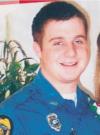Fish fry to benefit officer with cancer
By Nick Hiltunen
Published in News on May 11, 2009 1:46 PM

J.C. Serlick
James Serlick was the picture of health -- 24 years old, a Gold's Gym member, an advocate for exercise and his church.
But then things started going wrong for the young Goldsboro police officer, who was in Wake Forest University Baptist Medical Center receiving treatment last week.
Serlick was diagnosed earlier this year with a rare form of leukemia, chronic granulocytic leukemia, also known as CML. The disease starts inside the bone marrow, which is soft tissue inside bones which plays a role in blood formation.
The Goldsboro Police Department and Serlick's church, Pikeville Pentecostal Free Will Baptist Church, have organized a fish fry to be held Friday to benefit the officer and try to help defray some of the costs. Organizers hope to have orders in hand by Tuesday. For information, call Police Capt. Al King at 580-4273, Capt. Grayham Keesler at 580-4272 or the church at 736-3336.
Doctors have told Serlick that the disease may have been attacking him for years. He is in the stage known as "blast crisis," the third and most critical stage of the disease.
The National Institute of Health says it is not uncommon for the disease to go unnoticed.
"The chronic phase can last for months or years. The disease may have few or no symptoms during this time," according to the U.S. National Library of Medicine.
But most people are diagnosed during the first, or "chronic" stage, when they're having blood drawn for other reasons.
In leukemia, cancer "grows from cells that produce white blood cells," according to the U.S. National Institute of Health. The government institution says Serlick's form of the disease affects about 1 or 2 people in every 100,000, and can be the cause of 7 to 20 percent of cancers reported yearly.
The officer began to notice his symptoms on Feb. 9, when Goldsboro police had a call to help corral some errant livestock.
"We were working a night shift. We walked down the street, and got the cows back in the pasture and all that stuff. About 10 days later, I noticed I had something on the back of my leg, hurting me," Serlick said.
That wasn't the only symptom, Serlick said.
"At that same time, I started getting sick, started getting a sinus infection and all that stuff, and just couldn't get rid of it," the officer said.
Then he went to a local medical facility, where someone looked him over and "told me everything would be fine," and advised over-the-counter medicines for an upper respiratory infection, the officer said.
Those OTC preparations did him no good, Serlick said.
"I just kept getting more sick and more sick," he said. "(A doctor) told me that I had walking pneumonia," and other health problems.
But it wasn't walking pneumonia, either, and Serlick and his wife, Paige, began a day of waiting by the ATM at Wayne Memorial Hospital on the evening he was diagnosed. The waiting room was packed, he said.
The couple began waiting at 9:30 p.m., and saw a doctor around 1:30 a.m., the officer said.
The blood vessels had burst in Serlick's eyelids, "because I just put so much pressure on my own face," the officer said.
The doctor prescribed an IV bag of liquids immediately, then a second.
During the time, he drew some blood and ran tests, the officer said.
Serlick was starting to feel better, he said, pumped full of pain medication and getting a second bag of fluid.
Then, the doctor re-entered the room.
"He come in about that time, and he just didn't look good. He was looking at me like I was crazy, and I said, "Doc, after I get done with this bag, I have to go back to work tomorrow, and I won't get out of here until like 3 ..."
The doctor cut him off, Serlick said.
"I don't think you're going to have to worry about going to work tomorrow," the doctor said.
A normal person's white blood cell count is about 4,500 to 10,000 white blood cells per micro-liter of blood. Serlick's count was 219,000.
The officer thought that was a good thing -- it meant his body was trying to fight off whatever had been ailing him, the officer said.
But the doctor had bad news, he said.
"He said, "No sir, that just screams leukemia," the officer recounted.
Since that night, he has begun chemotherapy, and one doctor told him he could probably take a "pill for the rest of my life, and it would bring my counts down, and it did," the officer said.
Then came the bone marrow test, which showed "I had a whole bunch of the blast in there," which meant calling in a bone marrow and leukemia specialist, Serlick said.
Since then, he's had multiple bone marrow transplants, which cost $250,000 apiece, the officer said.
Serlick, for his part, has taken a bold stance at fighting the disease, describing the complex treatments with ease and saying his love of God will see him through.
"I'm trying to keep a positive attitude," the officer said. "I can't get bummed about it. I've got to fight through this and do the right thing."
The officer said he believes his faith will carry him through.
He said he believes God had something to do with the emergency room doctor who diagnosed him, Dr. Byron Geer, running the white blood cell test.
"Dr. Geer could have just blown off that blood test and I could be dead by now," the officer said.
